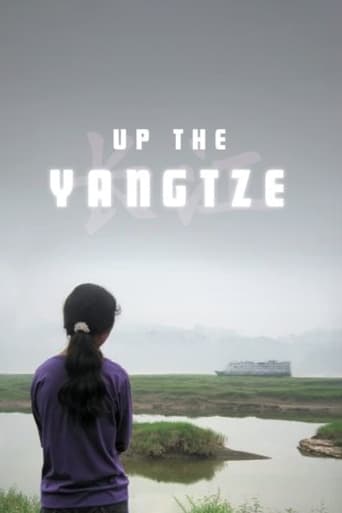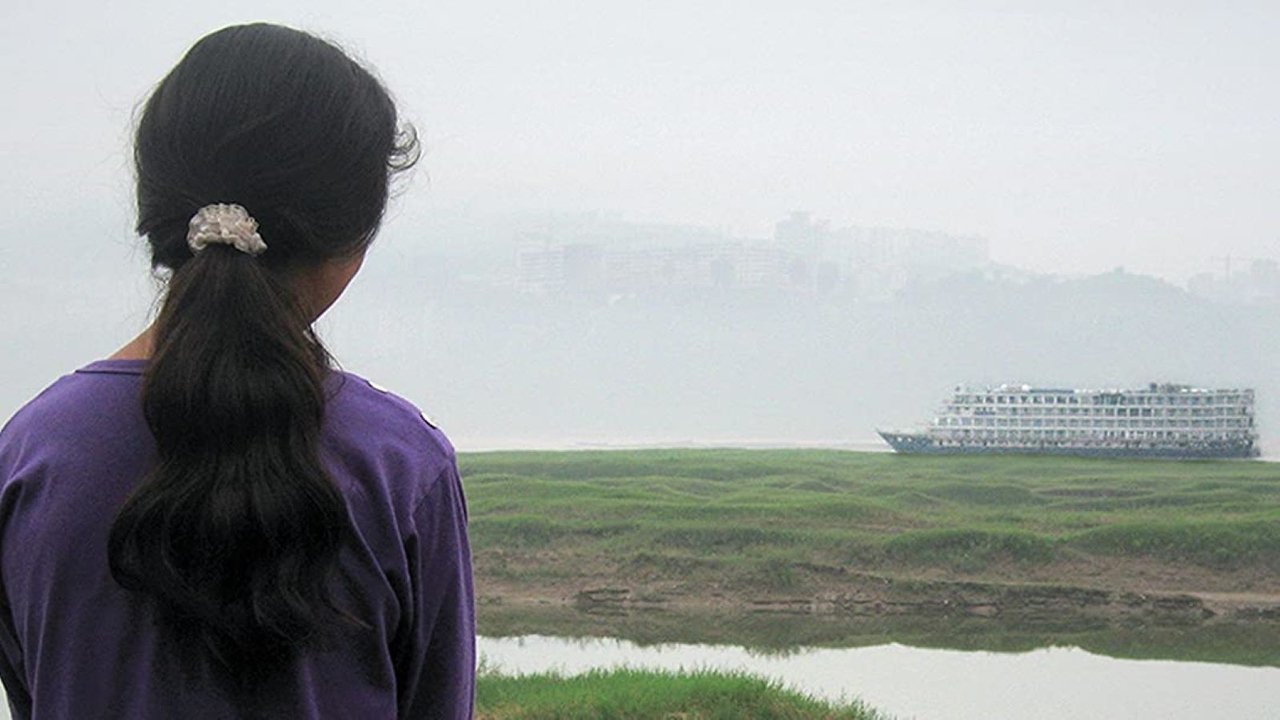Steve Skafte
For such a slow paced documentary, you might at first doubt it's ability to draw you in. Initially, I watched the film because I somehow expected it to be one man's journey into the depths of China. But, no, it's not really about that. Instead of diving into China as a geographical location, "Up the Yangtze" concerns itself with the culture and politics of modern China as it affects the average citizen.Two characters are central to this documentary's narrative. 'Cindy' who lives with her family in a shack beside the rapidly rising river, and 'Jerry' who comes from a higher standard of life in the city. They both find themselves working on a cruise ship which goes up and down the Yangtze river. The passages which deal directly with the ship and ship's passengers are rather revealing. The tourists come off largely as self-absorbed and unimaginative people with far too much money. They seem to all share peculiarly uninterested attitudes. This comes in rather stark contrast to the locals' acute awareness of their situation.There are several interviews throughout the course of the film that reveal a darker side than might first be visible. This is particularly poignant during an interview carried on with a shopkeeper while a heated argument goes on outside.Certain limitations are apparent in such a focused documentary, but it's very interesting and more than worth your attention.RATING: 7.0 out of 10
Michael McGonigle
I was very puzzled by Up The Yangtze and upon reflection; I must admit that I don't like this film. It feels dishonest and seems to be nothing more than a wishy-washy environmentalist's nightmare showing poor people being displaced by the construction of the Three Gorges Dam in China.The film simply wallows in an atmosphere of negativity about this massive dam project and the people who will be affected by it. I'm all about saving the planet, but does that mean there should NEVER be any kind of large construction project anywhere?I have been accused of being callous before and I expect I will be again, but I found it hard to feel sorry for the family about to be displaced in Up The Yangtze.The father is this mopey peasant who sits by helplessly while his shack, with dirt floors, no running water and a wood-burning stove slowly gets inundated by the rising waters from the dam.Excuse me; Three Gorges Dam began construction in 1994, it is now 2008. This peasant has had 14 years to consider moving and now, just as the water begins lapping around his shack does he suddenly come to the conclusion he better leave?Far from ignoring the plight of the people in the flood plain, in this man's case, the Chinese government moves him and his family to a nearby apartment with floors, electricity and modern marvels like flush toilets and indoor plumbing.And I'm supposed to feel sorry he lost his primitive shack?Up The Yangtze takes the position that the Three Gorges Dam is an ecological nightmare and will only serve to displace poor people and there is truth in this. But any large construction project displaces people; consider the Hoover Dam here in the USA. A person can argue that the growth of Los Angeles and Las Vegas were not improvements, but I would disagree.In my own city of Philadelphia, lots of ramshackle slums and poor people were moved to build the Ben Franklin Parkway which led to the steps of the Philadelphia Museum of Art where Rocky Balboa eventually jogged to the top of. You have to admit, sunrise on the open Philadelphia skyline is a better visual than poor crowded tenement buildings and slums.I was also confused by the formal aspects of Up The Yangtze. It seems to be the opposite of a "mockumentary". A "mockumentary" uses documentary techniques to tell a fictional story. Up The Yangtze seems to uses dramatic narrative techniques to tell a realistic story and it is very disconcerting.Up The Yangtze does this by focusing on two young people who get jobs on a riverboat that takes tourists (mostly Westerners) on sightseeing trips up and down the Yangtze. They are Jerry, a likable 19-year-old boy from a nearby city and Cindy, who is the daughter of the dipstick peasant who is awaiting the slow inundation of his shack.Genial, good looking and whip smart, Jerry is a most attractive and energetic person, but Up The Yangtze ultimately turns this hard working kid into the villain of the film because he DARES to hustle at work and provides extra good service for tips.Jerry quickly learns that he can make more in tips in one day than his grandfather could earn in a month. And we're supposed to dislike him because he is capitalizing on his youth, good looks and charm? I wish him all the success!The film seems to want us to root for Cindy, the wish-washy, peasant girl who breaks down crying every five minutes because she misses the dirt floor of the shack she has left to work on this riverboat.Let me see if I understand Up The Yangtze's attitude toward these two young people correctly. Jerry is good looking, neat, self-confident, hard working, speaks English, loves to meet new people, is extraordinarily friendly and thrives in his job as combination porter, waiter, bartender and entertainer.But, because one cheapskate, old-biddy from the USA accuses him of "expecting" a tip, he gets fired. For the record, Jerry denies the charge and seeing how he handles other passengers, he may be a bit over-friendly, but that is certainly not uncommon in the service industry.But looking at the arrogant, Western jerks that populate the cruise ship, I tend to believe he's innocent of the charge. It's not his fault if dumb-ass Westerners feel obligated to give him money to assuage their own guilt.So poor Jerry finds himself in the unenviable position of being too self-confident for his Chinese bosses, but not subservient enough for his Western guests.On the other hand, little Cindy gets to keep her job in the kitchen of the riverboat even though she is an annoying little wimp who cries every five minutes because she is so far away from her mopey father who is back home waiting for the water to rise and drown his shack.Maybe it's me, but promoting the weak subservient Chinese girl as an ideal is all wrong. Showing the mopey Chinese peasant waiting for the water to drown him while wearing the blank look of a dumb "coolie" from an old western is a portrayal of the Chinese people I find insulting and more than slightly racist.Like it or not, things are changing in China. Their economy is going global and the people will have to make adjustments. But if they are going to clamp down on the dynamic "Jerry's" who want to succeed and encourage the wimpy "Cindy's", then it will be no surprise that the "Jerry's" will leave China and probably come to America where they will embody a hard work ethic that will make them prosper in fields of business that many Americans would consider beneath them.And I say, Welcome!
Richard Adams
Sorry if you were looking for Wall-E or something else 'feel good', this is a documentary focusing on two young people at the center of change in China. The Three Gorges Dam, at the time of filming was beginning to flood areas where about 2 million people were being displaced, as we are told, for the good of the country, which appears a phrase parroted enough in the belief it will come true.'Jerry' is a Have, while 'Cindy' is a 'have not.' Both seek employment on a cruise ship for western tourists. Little is told of Jerry's family, which is apparently better off than Cindy's, which the film focuses on. Cindy's family are poor farmers who are doing fairly well, but know everything will change when their home and fields will be flooded. The hardship of change is clear and Cindy works hard to help support her family. Jerry doesn't show the same work ethic, which leaves the viewer to draw their own conclusion of traditional vs. modern values.Quite a lot of detail on modern China is available to the viewer, including frequent complaints of corruption. I was moved considerably by the contrasts and the snips of history, which show not all have prospered in modern China, though there is again parroted belief that anyone can succeed. It was also a bit surprising to see in China High School education is not a given for everyone.I found this to be a very informative and well done documentary and highly recommend it to anyone wishing to see the changes and impact of this dubious national project.
albertrchen
The biggest fear with documentaries is that they got bogged down in the boring details that don't do enough to tell a story. This film, however, is always intriguing because although it tackles a large issue, the impact the flooding of the Yangtze river valley that displaced millions of residents, it does it through the very human story of one family. There are some nice panoramic shots, and interlaced among the genuinely touching moments was a wry humour. It's a great film for those who want to see a portrait of the lives of contemporary Chinese in transition, and for those who want to see the aspirations of China, and the challenges that it faces.


 AD
AD
